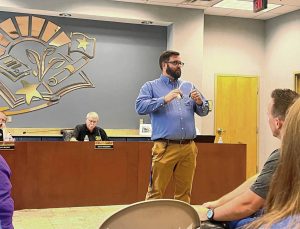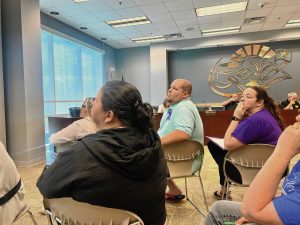A dedicated swim instructor, leveled swimming classes and drowning-detector headbands are some of the changes Clark-Pleasant schools plans to make to improve safety in student swim classes.

The Clark-Pleasant School Board on Tuesday held another work session to present the most recent revised pool safety policies and staff standard operating procedures. These changes come four months after Alaina Dildine, 15, died after drowning in the Whiteland Community High School pool during her physical education swim class. She was underwater for 52 minutes before she was pulled from the pool.
Clark-Pleasant’s administration and physical education department have been working on a new pool safety policy since the incident, after it was discovered the school had few policies in place at the time of Alaina Dildine’s drowning.
This was the second work session for the proposed pool safety changes. Several parents at the meeting in August left unsatisfied, saying there needed to be more rules outlined for staff and accountability for them.
New pool policies
Niki Morrison, the high school physical education department chair, and John Sincroft, head boys and girls swim coach, again presented new pool safety policies for swim classes. Many changes were made in direct response to parent concerns from the last meeting, they said.
A notable change proposed was leveled swim classes. They presented a plan to divide PE 1 students into levels, based on their swimming experience. Level 1 would be students who have no swim experience, Level 2 students would have some experience and Level 3 would be proficient swimmers. Students would be pre-tested at the beginning of the semester to determine their swimming level.
Once divided into levels, only one level of students would be in the pool for their swim unit in PE class, which lasts three to four weeks of the semester. For example, Level 1 students would be separated from the rest of their PE class to take the swimming unit with the school swim instructor for a few weeks, while the remainder of the class would remain in regular PE class with the PE teacher separately. Then, once Level 1 students complete the swim unit, Level 2 students would start their portion of the swim unit. This change differs from the previous model when all students in a PE class would complete the swim unit at the same time.
Each class would have a ratio of three staff members to no more than 24 students. Those three staff members would be a dedicated swim instructor, an adult lifeguard and a student lifeguard.
The swim instructor will be an addition to the school’s PE department. This person would not be a regular PE teacher, and would just be dedicated to teaching the swimming classes. They would likely be in the pool area all day, Morrison and Sincroft said. In the past, swim units were taught by the class PE teacher and a lifeguard/instructional assistant.
Clark-Pleasant has hired a swim instructor, and the school board is expected to approve her employment at the Sept. 19 board meeting.
Other new elements of the pool policy presented include outlined expectations for the swim instructor and lifeguards. All staff members working in the pool will be required to receive lifeguard certification training from the American Red Cross. Certifications will be checked and verified regularly by both the high school principal and the corporation’s human resources director.
Monthly training in the pool for the swim instructor and lifeguards would take place during Professional Learning Communities, or PLC, time after school. There, they would go over emergency scenarios in the pool, CPR refreshes and refresh on other trainings.
Outlined adult lifeguard expectations include requiring they take a lap around the pool both before and after class. The lifeguard’s sole responsibility will be to monitor the pool and students inside, rather than providing instruction. Lifeguards are expected to be professional, survey high-risk people in the pool, not have any distractions on the pool deck and not excessively talk to others while on duty, the proposed procedures say.
The swim instructor will be the person charged with instructing students during their lessons. They would have to take attendance prior to students getting in the pool and take attendance after students exit the pool. They will also supervise in the locker rooms before and after class.
These proposed safety procedures would also implement a buddy system for students swimming, the proposed policy says. As part of this, the swim instructor will do a “buddy check” any time the class transitions to a new exercise or to another section of the pool. Student pool partners would have to raise their hands or give a thumbs up to help the teacher know everyone is accounted for, Morrison and Sincroft said.
Student expectations presented at the last meeting remained in this policy draft. Those include locking the locker rooms during class, meaning students would need to bring items they need to the pool deck while swimming. Students would not be allowed to stand around the pool deck after class waiting for the bell to ring. There also would be a requirement for students with medical conditions such as epilepsy or narcolepsy to wear a flotation device unless a parent or guardian signs a release document.

Drowning detectors
In addition to these added policies, Clark-Pleasant is also considering purchasing Wave drowning detection headbands for all students to wear. These headbands would detect and sound an alarm if a student is in distress or is underwater for too long.
The headbands come with a charging station, where students would be asked to place them as they go to the locker room. Generally, a class set holds a full charge for a day, Morrison and Sincroft said.
Hobart High School in northwest Indiana uses the Wave headbands, and Morrison and Sincroft have been speaking with staff there about how well the devices function, they said. School officials there have given positive reviews of the headbands, Sincroft said. They plan to take a trip to Hobart soon to see the devices in action.
“These seem to be a really good option and possibility,” Sincroft said.
Clark-Pleasant can purchase classroom sets for around $15,000 to $20,000, Superintendent Tim Edsell said.
Parents ask for more
Around 20 parents, students and concerned community members attended the work session Tuesday night.
Parents generally agreed with the new policy presented but also asked for more details and areas for accountability to be added to it. Kyle and Victoria Dildine, along with a couple of other parents, asked for more details on what repercussions would be if a teacher or lifeguard did not follow the new protocols.
The Dildines have questioned several times why Clark-Pleasant has not fired the PE teacher who was at the pool when their daughter drowned. The teacher has been on administrative leave since May 17, and they were transferred to teach at another school in the district in August, according to the most recent personnel report.
“The fact of the matter is, you have to hold people who are supposed to be there accountable to watch the kids,” Victoria Dildine said. “This technology is wonderful, but you have to have people moving, you have to have people watching, you have to have people counting.”
She and other parents asked for more specifics to be added about how many times a lifeguard should walk the pool, how they should never be on their phones, how many students should be in each lane and more.
“Everything has to be spelled out. You can’t leave anything up to interpretation,” Victoria Dildine said.
For repercussions for breaking the new protocol, Edsell gave few answers on what would happen if a swim teacher was found to violate any of these presented rules. He said there are state laws that will be followed in terms of what is looked at to terminate a teacher’s employment.
“I’m going to tell you that every situation, we’ll handle it very, very seriously,” Edsell said. “I can’t speak for the past because I wasn’t here.”
Some parents also questioned the use of student lifeguards, who would likely be between the ages of 16 and 18 years old. As students, they won’t have access to records that would tell them if another student has a medical condition. Parent Sharna Yates said hiring a 16-year-old to be a lifeguard looks like a way to save money.
“We don’t need 16-year-olds. I love my kids, but we just don’t need it. I want three adults in there,” Yates said.
Many parents at the meeting said they no longer trust Clark-Pleasant schools because their trust was broken when a student died on their watch. The Dildines asked why the school did not hire a third-party agency to draft a new pool safety policy. They believe an outside consultant would bring transparency, Victoria Dildine said.
Edsell said they reached out the Indiana High School Athletic Association and the Red Cross looking for recommendations for a consultant, but could not find any.
Sincroft said he’s worked with other schools with swimming programs in the past, including Beech Grove, North Central, and Lawrence North. He also has reached out several other schools in Johnson County and the area to get their pool policies when working on a new proposal for Clark-Pleasant.
Morrison acknowledged the school and staff have trust to rebuild with parents and the community.
“I hope you guys know we also want this to be better,” Morrison said.
Board member kerfuffle

During the public discussion about the policy proposal, Kyle Dildine asked Board Member Kent Beeson to get off his phone.
“Can you pay attention to what’s going on out here, please?” Kyle Dildine said.
“Are you talking to me? I’m trying to pay attention,” Beeson responded.
“I know you’re trying. Put down the phone and pay attention because this is life or death,” Kyle Dildine said.
Kyle Dildine asked Beeson to say how he really feels because the meeting is being recorded. Beeson then said he doesn’t care it is recorded, and told Kyle Dildine he “cares more about this than you know, dude.”
Victoria Dildine then yelled at Beeson, saying that his child was in the pool lane with Alaina Dildine the day she drowned. The three then engaged in an argument that caused Beeson to walk out of the meeting.
While he was walking out, others in the room alleged he called Kyle Dildine an idiot. Wednesday morning, Beeson told the Daily Journal he said it was an “idiotic comment” for the Dildines to say he does not care about their daughter or the pool safety policy. He did not call anyone an idiot, he said.
Beeson said he was on his phone looking up potential third-party agencies that could help with pool safety because that question was asked a few minutes earlier.
His son was in class with Alaina Dildine when she drowned, and he didn’t see her. His son can’t swim, and he was “pretty distraught” after the incident.
“I lost lots of sleep over it. I’ve researched everything from those headbands … I’ve been doing lots of research and soul searching on, do we even need a pool?” Beeson said.
Beeson said he was upset by the assumption that he did not care, so he decided to leave the meeting before the argument escalated further. It was not the place and time to keep the argument going, he said.
He said he is an “emotional guy,” and he would not definitively say if he thought his actions were appropriate or not. Beeson has raised his voice and gotten into heated disagreements at times with members of the public at other meetings. He does not plan on resigning, despite some calls on social media asking him to step down.
“It’s just the way it is. Take it or leave it. I’m an emotional guy. I speak my mind,” Beeson said.
Beeson said he is open to having a private conversation with the Dildines about the argument.
The school board will hold a first vote on the new pool safety policies at their Sept. 19 meeting.




